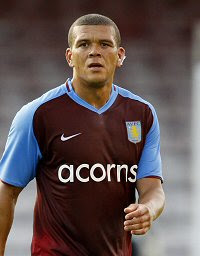
Perhaps England's best young player of the modern era, Rooney is adored at Manchester United. There reamins serious questions over his temperament - he blows a gasket at least three times a season - but his power, skill on the ball and awareness make him one of the most dangerous players in the league.
Once the teenage protege at Everton, he is now hated at Goodison for moving clubs so early in his career.
Rooney was reluctantly sold by the Toffees to United, ahead of interest from Newcastle, following Euro 2004 as he recovered from a broken foot suffered in the quarter-finals against Portugal.
And after bagging a hat-trick for United in his belated debut against Fenerbahce he became an instant hero.
A powerhouse performer, Rooney can put the fear of God into any defence he faces. With immense strength, a thunderbolt shot, pace and great vision he has the attributes to be the complete modern-day forward.
He was first brought into the Everton squad for the pre-season friendlies prior to the start of the 2002/03 season. And Rooney was a revelation - despite still being only a 16-year-old.
His Premiership debut came in a 2-2 home draw with Tottenham Hotspur on the opening day of the 2002/03 season - and Rooney created the first goal for Mark Pembridge.
Rooney's first ever goal came in October against Arsenal. The Gunners were looking to stretch their unbeaten run to 31 games when, in the last minute, Rooney superbly controlled a long ball from Thomas Gravesen, turned, and fired an unstoppable shot in off the underside of the crossbar to win the game for Everton. The stuff of legend.
That goal made him the youngest goalscorer in the history of the Premiership - although that record would be eclipsed within a few weeks by Leeds United's James Milner.
Rooney's success in his inaugural senior season continued at international level when he was fast-tracked into the England team - becoming the youngest player to represent his country when he made his debut against Australia in February 2003 at the age of 17.
He then went on to become England's youngest ever goalscorer when netting against Macedonia in a Euro 2004 qualifier in September 2003.
He was selected for Euro 2004, and became one of the stars of the tournament, filling column inches around Europe with his powerful and skillful displays showing maturity beyond his years.
His first goal against Switzerland made him the youngest goalscorer in European Championship history although, as in the Premiership, he lost that record within days to a Swiss player - Johan Vonlanthen.
Rooney's tournament ended in dismay against Portugal in the quarter-finals, when a seemingly innocuous challenge with Jorge Andrade resulted in the striker suffering an infamous metatarsal injury.
The broken foot ended the player's involvement in the 27th minute - an injury which would force him to miss the start of the 2004/05 Premiership season.
Rooney moved to Old Trafford four hours before the transfer deadline passed in August 2004, for a guaranteed fee of £20million. There was additional £7million on the fee, made up of Rooney's appearances for United and England, the length of his stay at the club and the performance of the Red Devils at home and in Europe.
His suspect temperament hit the headlines in November 2004 when he had to be substituted after a series of over the top challenges in an international friendly against Spain in Madrid.
In September 2005, Rooney received his first red card in United colours. Straight after being booked in a Champions League group game, again in Spain, at Villarreal the player clapped the decision in the ref's face. Out came the second yellow and Rooney was off.
Rooney again fell victim to the curse of the metatarsal at the end of the 2005/06 season at Chelsea. It became a race to be fit for the World Cup, a race he won yet was barely fit to play for his country. The lack of sharpness snapped that famous temper and he was sent off for what looked like an attempted castration of Portugal's Carvalho in the quarter-final.
Cristiano Ronaldo's role in the affair became infamous and overshadowed the beginning of the 2006/7 season, especially after Rooney was banned for being sent off in a pre-season match in Holland.
Rooney is certain to be vital to club and country for years to come. A true match-winner of the type every team craves, it is difficult to forget just how young he remains.
Though some believe Rooney should score more goals, his all-round ability makes him a certain starter when fit an of vital importance to any side his plays for.






























